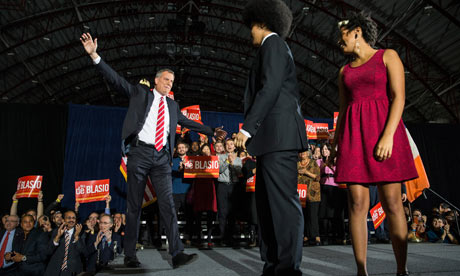New York voters elected their first Democratic mayor for 20 years on Tuesday, picking Bill de Blasio to lead the city out of the unprecedented three-term reign of billionaire businessman Michael Bloomberg.
The result was never in doubt, but the margin of victory represented a landslide for De Blasio, a 52-year-old self-described progressive who led his Republican rival, Joe Lhota, in opinion polls throughout the campaign.
Delivering his victory speech in the Park Slope neighbourhood of Brooklyn where he lives, De Blasio sought to temper expectations that were sky-high after his repeated campaign pledges to unite New York's "two cities" – those of the haves and the have-nots.
"Let me be clear, our work, all of our work, is really just beginning," he said. "We have no illusions about the task that lies ahead. Tackling inequality isn't easy. It never has been and it never will be. The challenges we face have been decades in the making, and the problems we sought to address will not be solved overnight. But make no mistake, the city has chosen a progressive path and tonight we set forward together on it, together as one city."
De Blasio made a veiled reference to New York's controversial stop-and-frisk policing in the speech – something that had served as a divisive issue between he and Lhota on the campaign. Safety and civil liberties "are not mutually exclusive", De Blasio said, adding that there needs to be communication between police and the neighbourhoods they serve. "We are stronger and safer as a city when police and residents work hand in hand."
De Blasio based his campaign on a portrayal of New York's "two cities". He has promised to expand pre-kindergarten and after-school programs by raising taxes on high earners. It remains to be seen if De Blasio will be able to raise taxes, however, which requires approval from New York State in Albany.
He will be sworn in on 1 January when he will become the 109th mayor of New York City, replacing Bloomberg, a former Republican who ran as an independent. The city council allowed Bloomberg to run for a third term, controversially accepting his argument that in the wake of the financial meltdown, he should be allowed to continue leading the city. A two-term limit was later restored.
Lhota gave a relatively low-key concession speech. "I have fought the good fight and I have finished the race," he said. Lhota wished his mother happy birthday, and thanked former mayor Rudy Giuliani, under whom he served as deputy.
"Let it be known I will not spend one moment of my future regretting
what might have been," Lhota said. He left with an upbeat message in
what has been a rather damp squib of a campaign. "New Yorkers never quit, New Yorkers never surrender, New Yorkers never hide from history, we make history."
De Blasio becomes the first Democratic mayor of New York since David Dinkins, elected the city's first and only black leader in 1989. De Blasio worked on Dinkins' campaign 24 years ago, where he met his wife Chirlane McCray.
McCray and the couple's children, Dante and Chiara, featured extensively in De Blasio's campaign. Dante, 15, appeared in and narrated De Blasio's first television commercial.
De Blasio had been up by almost 40 percentage points in every survey conducted since he and Lhota won their respective nominations.
At De Blasio's victory party at the YMCA in Park Slope, Brooklyn, supporters were jubilant. Amina Abdul-Wahhab, 40, said: "It makes me feel great, I feel like there's gonna be a lot of progress, he's really fighting for the working class," she said. "We finally have a politician who is fighting for the everyday people."
Abdul-Wahhab lives in East Flatbush, around four miles from Park Slope but a world away in terms of average incomes. "There's a lot of working class people struggling just to make ends meet," she said. She said early childhood education was a key policy for single parents in the neighbourhood.
Leon Goldenberg, a real estate agent from Midwood, was "absolutely excited", despite observing that De Blasio's victory "seems to have been set in stone after the primary". He added: "You don't have the high you normally would when it's a close race," he said.
Asked how the city will change under De Blasio's leadership, Goldenberg said the change would "not nearly be as dramatic as people expect".
"There'll be a little less of the friction that the current mayor has caused," he said. De Blasio would be "less Manhattan-centric", and "hopefully there'll be more affordable housing", Goldenberg said.
De Blasio was not initially fancied to win his party's nomination ahead of his main rivals Bill Thompson, the city's former comptroller, and Christine Quinn, the city council leader. Quinn was the early favourite to be the Democratic nominee but De Blasio won 40.81% of the vote in the primary, winning the poll outright.
Lhota, the losing candidate, described himself as a "fiscal conservative and progressive socially". Throughout the campaign he attempted to portray De Blasio as soft on crime – "recklessly dangerous" on crime, one ad said – but his message failed to gain traction. In one of his final campaign acts Lhota criticised De Blasio after the Democrat admitted he was "not a morning person".


















